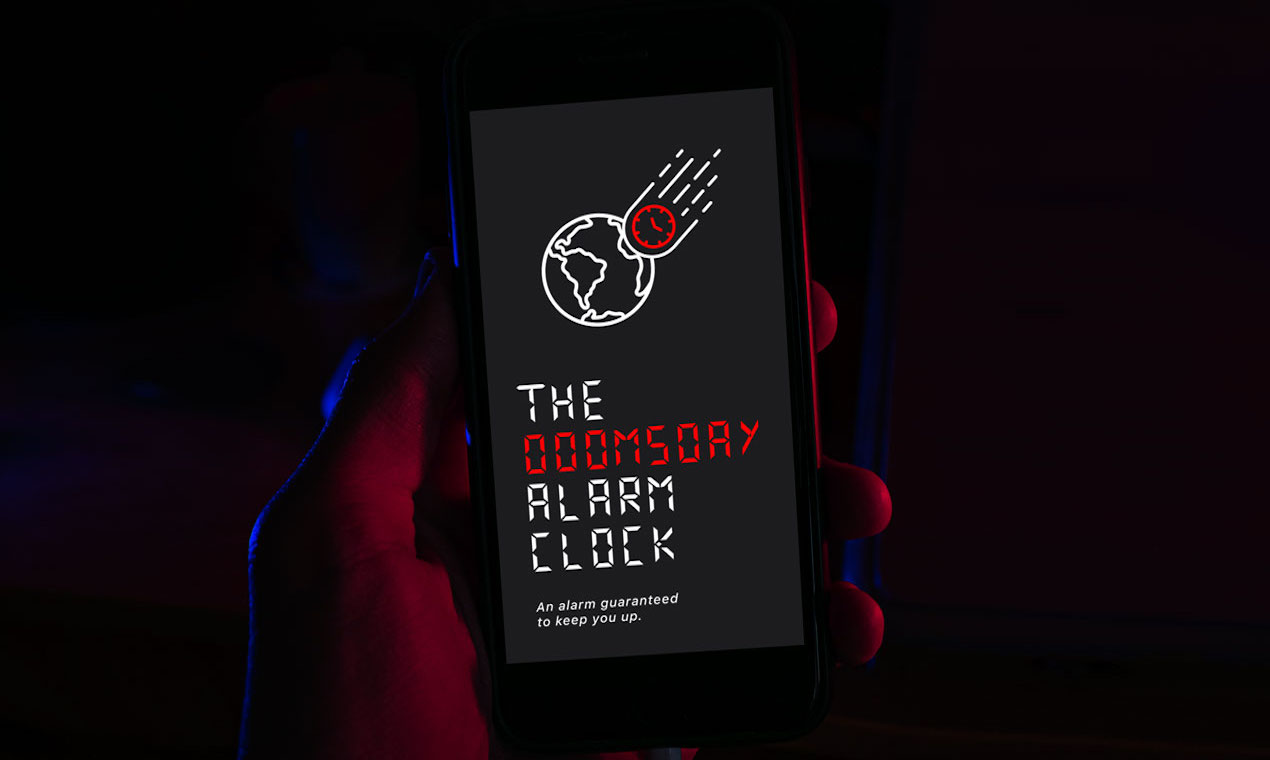As if waking up and checking the news on your phone wasn’t harrowing enough, a new app wakes you up in the most apocalyptic way possible.
The Doomsday Alarm Clock makes sure you start your day with some of the world’s most terrifying true facts. Rather than being woken up by a ringing or beeping sound, users can choose between a selection of sobering information about super volcanoes, global warming, asteroid strikes, nuclear war or “evil A.I.”, told, ironically, by a robotic sounding voice. Tense, thriller-movie style suspense music plays in the background.
Videos by VICE
The app’s website says: “Simply choose a doomsday scenario and prepare to be awakened by bone-chilling facts about our eventual demise.”
Users who choose to learn about nuclear war are told, “There is no proven defence against nuclear attack. All we can do is pray. Good morning.”
Steve Nass, 32, developed the app with Peter Henningsenn, 34. Both are copywriters from New York. Nass said, “We’re both heavy sleepers who like making stupid stuff for the internet. So we started riffing on ideas for an alarm clock that would work for anyone, even us.
“The Doomsday Clock had been in the news around that time and we were just like, what if we could turn this into an alarm clock?”
The Doomsday Clock is a symbol created by artist Martyl Langsdorf in 1947 and published on the front cover of the Bulletin of the Atomic Scientists to represent how close humanity is to “midnight” – or an apocalypse created by unchecked scientific advances such as nuclear weapons.
2022 is the 75h anniversary of the Doomsday Clock and it is currently set at 100 seconds to midnight for the second year in a row – the closest that it has ever been to midnight.

Research has shown that people who consume negative news in the morning are 27 percent more likely to report that they have had a bad day.
Dr Matthew Smith from the Centre for Positive Psychology at Buckinghamshire New University is doubtful that waking up to news of an impending apocalypse is a good idea. “From a psychological perspective, I can see it being potentially not a helpful thing to encourage people to do,” he said.”
“Because they just say the very first thing they’re waking up to, it sets the agenda for the day.”
Rather than ignoring bad news, he advocates, “realising you can choose how much you want to really give attention to, given a lot of digital culture allows us to have access to news 24 hours a day.”
“Notice when you’re watching something – are you doing so because you want to and it’s important for you to do so? Or is it through for example laziness, checking the news because it’s easily available on your phone?”
“You are not obliged to digest news all the time.”
The app is free, but the developers are encouraging people to donate to Earth Justice, a nonprofit environmental law organisation which litigates environmental issues, “to avoid our actual doomsday”.
“Of all the scenarios we’ve depicted, climate change still seems the most likely to cause our collective demise,” says Nass. “Earth Justice appealed to us because it specifically aims to create change through legislation – the boring, annoying process that seems to be the only way to actually get things done. Couldn’t hurt to toss a few dollars their way.”
Nass says the pair have used the app to wake up, and have forced their friends to do the same for development purposes.
“Neither of us are morning people, but something about the voice we picked – which is an A.I. by the way, how creepy is that? – has a way of jolting anyone out of bed,” says Nass.
“As the creators, our primary reaction to it is ‘thank God it works.’ But it’s interesting to hear how other people feel about it. Some appreciate the humour and message. Others say it really stresses them out. Which is understandable.”
The app is only available on the App Store currently but the developers hope to release it on Android in a couple of months, if we’re all still around by then.


